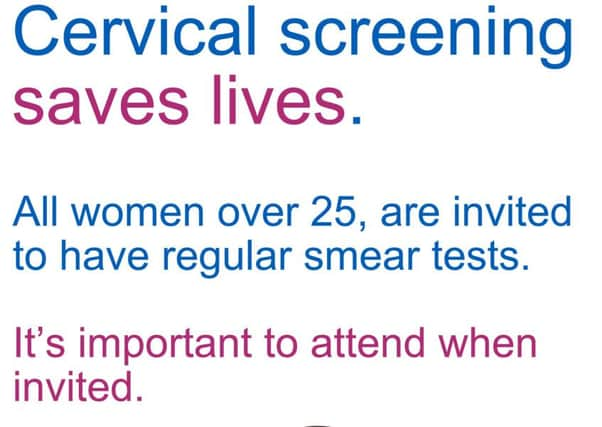HEALTH AND CARE: Women urged to #SmearforSmear


Cervical cancer is the most common cancer in women under 35 but it is largely preventable thanks to cervical screening and the HPV vaccination programme.
Despite this latest figures show that the number of women aged 25 to 29 years being screened for cervical cancer is falling year on year.
Advertisement
Hide AdAdvertisement
Hide AdIt is also the lowest age group to follow up their invite to attend a screening appointment.
Last year one in four women did not attend for screening when invited, and that increases to one in three under the age of 29 did not go to their appointment.
Surveys undertaken by cancer charities indicate embarrassment and a lack of understanding of the causes of cervical cancer may be behind the fall in the number of women attending their appointment.
This week, as the country marks Cervical Cancer Prevention Week, the local NHS is working to raise awareness of the importance of cervical screening and its role in preventing cancer.
Advertisement
Hide AdAdvertisement
Hide AdEvery year more than 5,000 women are diagnosed with cervical cancer.
However, the number of women dying from cervical cancer has halved over the past 28 years, as a result of the NHS screening programme and improvements in treatment.
Cervical screening, also known as a smear test, is a preventative measure and can help to detect pre-cancer abnormalities, which, if left untreated, may develop into cancer.
It is so important as cervical cancer can be prevented if the changes are found early enough.
Advertisement
Hide AdAdvertisement
Hide Ad95 per cent of results will be normal and of those that are not, the vast majority can be treated very easily and will never develop in to cancer.
The actual test is relatively simple; it takes about five minutes and is carried out by a practice nurse at your GP surgery.
Screening is offered to all women aged 25 to 64 years old, with women aged 25 to 49 screened three yearly, and women aged 50 to 64 screened every five years.
There is a concern that the HPV vaccination that is carried out in schools may protect women completely from cervical cancer.
Advertisement
Hide AdAdvertisement
Hide AdHowever, although the vaccination protects against the two most common HPV types that cause 70 per cent of cervical cancers, the risk is not completely eliminated and screening is still an important part of preventing cancer.
Find out more about cervical screening on NHS Choices – www.nhs.uk – and see more about Cervical Cancer Prevention Week and how you can support at www.jostrust.org.uk
---
• Benefit from an ongoing discount on your Herald or Littlehampton Gazette by joining our voucher membership scheme. Once you’ve subscribed we’ll send you dated vouchers which can be exchanged for your paper at any news outlet. To save money on your Herald or Littlehampton Gazette simply click here.